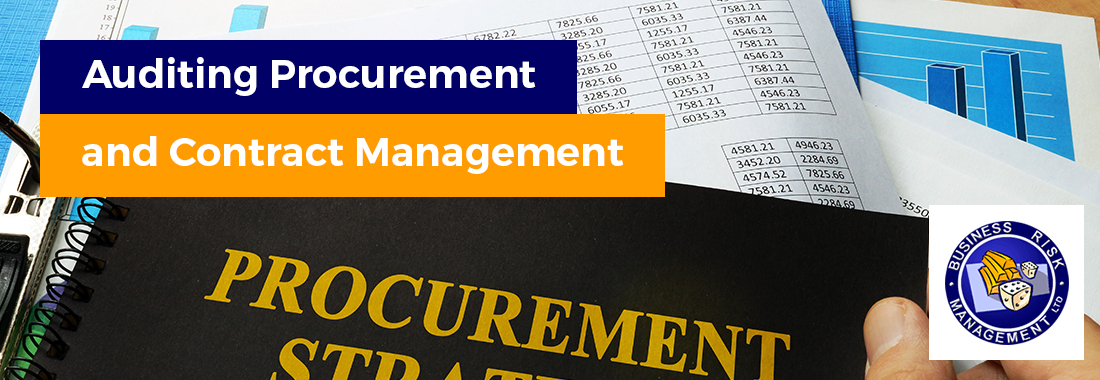Auditing Procurement and Contract Management

Overview
The success of a business strategy is significantly impacted by the quality of both the procurement strategy and how the resulting contracts are managed. An effective procurement management process ensures that all products and services are cost effectively acquired in order that projects and contracts can proceed efficiently and successfully.
Procurement management can also play an important role in spearheading corporate social responsibility
This course will help you conduct an in depth review of your organisation’s procurement and contract management processes
After completing this course you will be able to
- AUDIT the effectiveness of the procurement strategy
- ASSESS the procurement risk management process
- EVALAUTE the supplier management process
- REVIEW the effectiveness of the tendering process
- AUDIT all stages of the procurement process
- ASSESS the effectiveness of fraud prevention in the procurement process
- EVALUATE procurement social responsibility and sustainability
- REVIEW all aspects of the contract management process
- ENSURE contract management risks ae effectively dealt with
- EVALUATE the different types of contracts with confidence
Course Details
Course Level
- This is an intermediate level course and delegates should ideally have 12 months experience in audit
- There are no minimum educational requirements
- No advance preparation is required
- Delivery method – On-line-live (with exercises to demonstrate audit scenarios and situations that delegates will encounter)
CPE credits
Participants will earn 9 CPE credits in the Auditing field of study.
Modules
Day 1: Auditing the procurement process
Auditing the procurement strategy
- Framework for purchasing decisions
- Is there clear direction from the top?
- Procurement strategy
- Does it encourage suppliers to be innovative?
- Is the procurement plan developed well in advance through consultations with all parties?
- Is there a long term plan for procuring essential goods and services
- Objectives and targets
- Delegation and authority limits
- Procurement strategy in line with business strategy?
- Does it meet the 3 E’s?
- Economy
- Effectiveness
- Efficiency
- Minimising the cost whilst maintaining acceptable quality
- Carrying out periodic reviews to identify over- complex procedures
- Benchmarking costs etc. with others in the sector
- Local sourcing
- Policy re using new suppliers
- Collaborative procurement
- Exercise 1 – Auditing the procurement strategy
Evaluating the pre- procurement process
- Check that requisitions are complete, in the prescribed form, and signed by authorized officers.
- Ensure corrections, additions and alterations of the requisitions are authenticated by authorised officers.
- Make sure procurement proposals are initiated, processed and approved by authorized officers as per their delegated powers.
- Ensure there are no cases of overstepping of delegated authority in planning and initiation of procurements.
- Ensure users, planners and procurement officers are able to access to procurement system in a controlled manner.
- Check that the requisitioning and planning personnel are aware of technological advances in the field of goods and services being procured.
- Ensure that obsolete technology equipment and stores are not requisitioned and procured.
- Ensure purchases are planned after taking technical expert advice about the appropriateness of the goods and their technical specifications
- Was cost benefit analysis done to establish justification for procurement?
- Ensure procurement of same types of goods are consolidated to take advantage of quantity discountsIf procurements are funded by an external agency, ensure funding agency’s conditions are taken into account in planning the procurements.
- In case of delays in planning for procurement, the auditor should examine its impact on organisational goals and objectives.
- How is excessive purchasing avoided?
- Returns process
- Intellectual property
- Low value purchases ( are procurement cards used)
- Exercise 2 – Auditing the procurement cycle
Assessing the procurement risks
- Inflated unachievable targets
- Unduly favouring certain suppliers with high quantity orders
- Use of allotted budget during the financial year without immediate requirement of goods.
- Procurement not fully linked to inventory management
- Emergency contracts
- Insufficient timeframe for the procurement process (from initiation of requirements by the users to award of contract).
- Officers assigned the job of procurement of sophisticated equipment and systems may not have the necessary skills and experience
- Certain purchases are not made by the Procurement function
- Procurements not properly planned with the finance to ensure availability of funds as per procurement schedule.
- Legal and environmental concerns not fully taken into account
- Exercise 3 –Procurement risks
Preventing procurement fraud
- Price fixing
- Market fixing
- Bid rigging
- Manipulation of specifications
- Manipulation of procurement procedures
- Bribery for awarding a contract
- Bribery for disclosing confidential information
- Conflict of interest
- Cyber fraud – hacking into the procurement system
- Fraud indicators and how to use them
- Exercise 4 – The fraud risks
- Ethical and sustainable purchasing
- Are key suppliers chosen for their ethical and environmental credentials?Are opportunities taken to develop the ethical reputation of the business by choosing sustainable procurement sources?
- Does the business have a responsible purchasing policy/Code of Conduct for suppliers?
- Are ESG criteria included in the selection and monitoring of key suppliers?
- Compliance with health and safety regulations and/or
- Departmental guidelines
- Packaging materials (quantity, biodegradability, recyclability etc.)
- Exercise 5 –Ethical and sustainable procurement
Day 2: Auditing the contract management process
Supplier management
- How reliable is the method for assessing & managing supplier performance?
- KPI’s
- Targets and improvement initiatives
- Approved Suppliers
- Improving supplier performance and capability
- Managing and developing relationships with suppliers
- Managing the wider market issues that impact on the contract,
- but lie beyond the supplier
- Have supplier workshops been held?
- Could IA establish one – if they have not been held recently
- Exercise 6 –Supplier management
The Tendering and bid process
- Procedures should specify the precise tendering requirements – are they comprehensive?
- When were they last updated?
- Is the scoring system fit for purpose?
- How many contracts have been let where the score was not the best?
- Has the approval process been followed?
- Have the minimum number of tenders been received?
- Selection of suppliers
- Competency and viability
- Maximum work per supplier
- Assessing track record (good and not so good assignments)
- Evaluating fit with corporate culture
- Segregation of duties in the tendering process
- Could valid suppliers be excluded from the bidding process
- Look carefully at single sourcing contracts to ensure all are
- justified
- 20 key risks in tenders & bids
- Exercise 7 –Assessing the tendering process
Auditing the contract management process
- Contract management oversight
- Managing the timetable for making key decisions
- Developing strong internal and external relationships that facilitate delivery
- Ensuring the service and payments are provided in line with the contract
- Effective handling of changes to the contract
- Improving supplier performance and capability
- Key contracts
- High profile
- High value
- Not easily specified in advance
- High volume contracts – non critical
- Easier to specify
- Generally given to lowest bidder
- Contract agreement risks
- Contract does not clearly specify the services required
- Legal responsibilities are not allocated to each of the parties
- The agreement does not address key risks for your organisation
- Inappropriate changes are made to the agreement
- You may incur excessive charges on termination of the agreement
- Responsibility and ownership of assets is unclear
- You are unable to enforce conditions
- Contract is overly prescriptive
- Exercise 8 –Assessing the contract process
Evaluating the key aspects of contract agreements
- Scope of services
- Has this been defined well enough?
- Have there been any dispute as to what is included?
- Specific standards of acceptability set in the contract
- Duration
- Have specific dates been set
- Are variations allowed?
- What penalties are there?
- Price and payment
- What basis has been set?
- Is there a payment schedule?
- How is payment linked with progress?o What happens in situations of dispute?
- Variations and claims
- Performance management
- Performance guarantees
- Sub-contracting arrangements
- Contract risks
- Overbilling
- Duplicate payments
- False invoices
- False Claims and variations
- False performance reporting
- Phantom suppliers
- Sub-standard materials
- Misappropriation of assets
- Termination and suspension
- Right to terminate if contractor is in default
- Company should have right to recover costs from employing another contractor
- Cover for additional costs
- Exercise 9 –Auditing the key aspects of the process
About Phil Griffiths
Phil Griffiths, FCA

Phil Griffiths is founder and Managing Director of Business Risk Management Ltd.
A Chartered Accountant, he has over 30 years experience in risk management, Corporate Governance, internal audit and fraud prevention as practitioner, professional adviser, facilitator and trainer.
His areas of specialism are:
- Assisting Senior Management to identify, manage and then exploit the risks within their business via facilitated business risk management programmes
- Helping Internal Audit functions to implement world class standards.
- Developing fraud prevention, detection and investigation programmes
- Training both private and public sector organisations in all the above disciplines.
He has extensive experience of the European, Asian, Middle Eastern, and African markets having trained professionals from over 1000 organisations in these regions during the past 15 years
He has extensive experience of managing and auditing major International projects. He has also direct experience of negotiating major contracts (including the largest mobile telecommunications contract in the world at the time)
Phil has developed strategic alliances with professional bodies and world renowned training companies, to deliver training and consultancy services across Europe, Asia, the Middle East and Africa.
He has developed over 300 training courses on all aspects of internal audit, risk management and fraud and delivered them across the globe.
He has led risk management programmes for more than 120 private and public sector clients tailored specifically to include facilitated workshops, development of risk strategies and assistance with implementation
He is an accomplished author. His book ‘Risk Based Auditing’ is an international best seller and his new book ‘Enterprise Risk Management – the key to business success’ is receiving much acclaim
Phil has published research into many aspects of internal audit and risk management best practice, including “Strategic Risk management” “The Need to Co-ordinate Assurance Providers” and “The Expectations of Chief Executives towards Internal Audit and its future”
He is recognised as an accomplished and charismatic facilitator, trainer and lecturer and is in continual demand to speak at the most prestigious events on risk management, internal audit and fraud.
Schedule Overview
Course Fee and Timings
- First delegate: USD 1300 (GBP 1000)
- Second delegate: 15% discount
- Third delegate and over: 25% discount
Fee includes comprehensive course materials. The course will consist of three 1.5 hour sessions each day.
The course will consist of three 1.5 hour sessions with the following UK timings
- 9.00 – 10.30 Session 1
- 10.30 – 10.45 Break
- 10.45 – 12.15 Session 2
- 12.15 – 13.00 Break
- 13.00 – 14.30 Session 3

